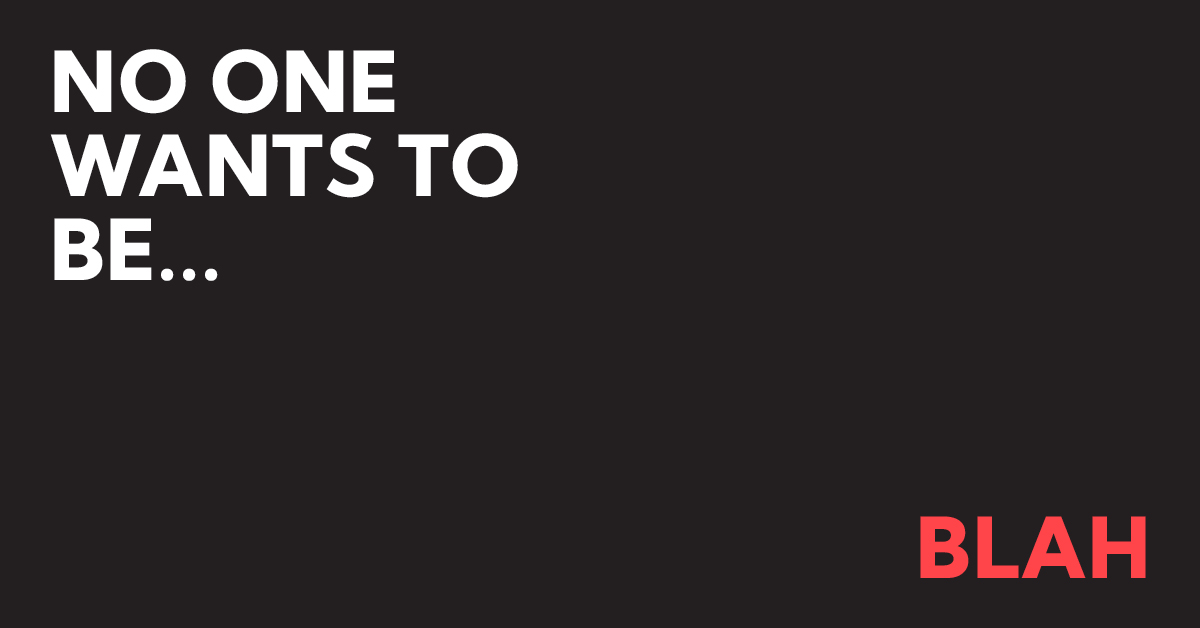Mediocrity in the age of AI: Your brand must be meaningfully different
Everywhere you look right now, people are talking about (and using) Artificial Intelligence (AI). Particularly ChatGPT, which has revolutionised the way that content is created, and Midjourney, which allows the creation of realistic images.
But here’s the thing. AI is literally mediocrity smooshed together and accessible to all. But; it’s fast, it’s free — and it’s here to stay.
So, in a world that’s about to get a hell of a lot blander, branding has never been more important. You need to know who you are and what you stand for and communicate it at every single moment. You must be meaningfully different.
Why? Kantar BrandZ global data shows that brands with strong clarity (meaning that what they stand for is well understood) contribute 70% more to sales. You can even charge more, too, with people who are primarily brand-driven (they choose a brand first, then look for the best price) paying, on average, 37% more than for other brands.
BECAUSE NO ONE WANTS TO BE BLAH
We’re not saying that AI doesn’t have a seat at the table when it comes to business. Different AI technologies are invaluable in streamlining operations, enhancing efficiency, and optimising decision-making.
However, the ubiquitous access to AI tools threatens to homogenise content and messaging, leading to a ‘one-size-fits-all’ approach that blurs brand individuality.
As writer Ray Naylor said in a recent Time Magazine essay: “Because they [AIs] cannot truly innovate, everything that predictive language and image models will produce will be a sequel to what came before: not an original idea, but a mash-up of our old tropes, repackaged for our consumption. This was already a dominant tendency in our commercial industries—to simply take what has been done before, tweak it a little, rebrand it, and call it new. As a result, AI will fill the world with grindingly average texts, passable but derivative illustration and video, and unoriginal but functional new product designs.”
Put simply, while AI can accelerate processes and workflows, its generic nature breeds uniformity and stamps out creativity. And when it comes to your brand. That means death.
WHY YOUR BRAND SHOULDN’T RELY ON AI
Mediocre and bland content (and more of it everywhere)
Using AI for content creation might get the job done (sometimes), but it’s highly unlikely to get it done well. AI-generated content, while efficient if you have the right prompts, often lacks the spark and personality that sets your brand apart, leaving it swimming in a sea of sameness. Curation and editing is essential!
Off-brand tone of voice
Verbal identity is an integral part of your brand, and copywriting is a skill that should be valued. AI can’t grasp the nuances and intricacies of your brand’s personality and voice, which means that you’re risking a disconnect with your audience with every word. While you might be able to train the AI to get close to your brand voice, a little extra (human) polish goes a long way.
The ethical considerations
How would you feel if someone stole your product idea or copied your brand’s logo? AI has been trained by using writers, artists and creators’ works without permission. Many say that AI is powered by theft. Entrusting AI blindly can lead to your own inadvertent ethical pitfalls too, from perpetuating biases to privacy concerns. The result is that you could easily tarnish your brand’s integrity, all for the sake of sounding exactly like everyone else.
HOW CAN YOU MAKE YOUR BRAND MEANINGFULLY DIFFERENT?
Being meaningfully different is all about brand differentiation. That means defining what sets your product or service apart and why your customers should invest their time and money in it. Why should they opt for you over your competition? What unique value does your brand offer?
Once you’ve defined your brand’s identity, it’s time to embody it fully across every facet of your business. Throughout every interaction with customers, consistency in brand representation becomes non-negotiable.
IS IT EVER OKAY TO USE AI FOR BRANDING?
We firmly believe that shaping your brand is a truly transformative process – doing the work is part of the magic of shaping the outcome. Deep collaboration between key stakeholders and brand experts, built on consumer insights, paves the path to building a well-articulated and distinctive brand. By all means AI can be leveraged like any other tool during the process, but it is not a replacement for the collective power of collaboration.
Leveraging AI with the right human driver (or should we say prompter) who has the right expertise and knows your brand inside and out, can provide significant value when it comes to implementation activities such as marketing.
A good example of this might be that you’ve written a thought leadership piece for your company website, and you want to share it on social media. Asking ChatGPT to write 10 social posts with different angles from the article is a great way to speed up the process and spark new ideas. The trick is not to just copy and paste ChatGPT’s resulting social media posts; but to be inspired by the ideas and refine them with your brand’s tone of voice and key messaging.
You might also use it for competitor analysis, analysing patterns and trends in your industry, and offering suggestions for improvement of existing content. For small businesses especially, this can prove invaluable. But if you are going to use AI, it should always be about enhancing original content, not creating it.
HOW WE CAN HELP YOU BECOME MEANINGFULLY DIFFERENT
If you’d like to find out how you can make your business stand out, we’d love to help. You can schedule a call with one of our branding experts.









